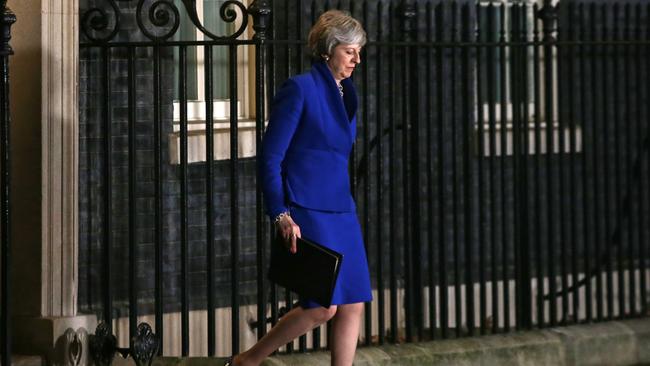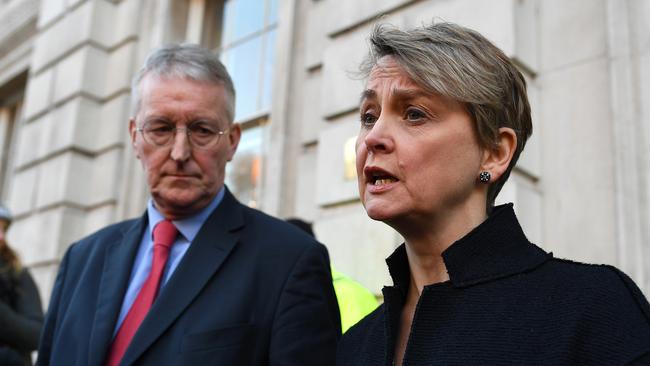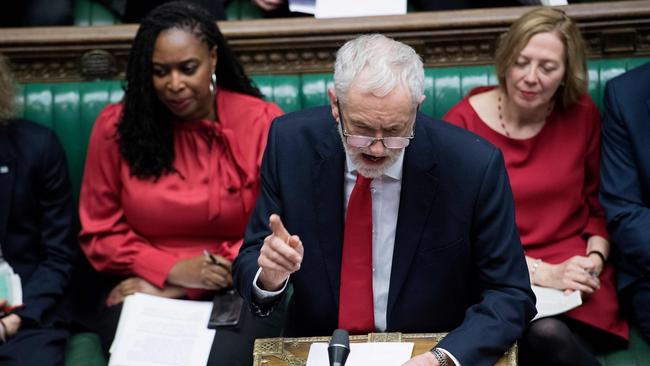Brexit: Labour in crisis as MPs defy Corbyn to attend talks
At least two Labour politicians have defied Jeremy Corbyn and engaged in urgent Brexit crisis talks with the Tory government.

At least two Labour politicians have defied an edict from Jeremy Corbyn and engaged in urgent Brexit crisis talks with the Conservative government overnight.
Mr Corbyn had demanded that all Labour MPs refuse to attend any discussions with Mrs May or her MPs because she hasn’t taken a no-deal Brexit off the table.
However the leaders of all the other major parties spent the day at the Cabinet Office and Downing Street making clear their very disparate views on how the Brexit crisis should be overcome.
But Labour MPs Yvette Cooper and Hilary Benn, two of the Labour Party’s most senior backbenchers, met with government officials saying they were at the Cabinet office because both chaired cross-party select committees.

Technically they weren’t in breach of Mr Corbyn’s written demands that Labour MPs boycott the talks.
Mr Benn said upon arrival that the really important development was: “There’s an open door, (but) is there an open mind to a change?’’
Ms Cooper has been one of Labour’s fiercest critics of Mrs May, incredulous that she can continue with her Brexit Withdrawal bill after Tuesday’s thumping defeat.
“We want to see if the government is actually prepared to make some changes,’’ she said.
Mrs May told Mr Corbyn that ruling out a no-deal Brexit as a condition to begin talking was “an impossible condition’’.
She encouraged him to talk and see “if we can begin to find a way forward for our country on Brexit’’ and asked him: “Is it right to ask your MPs not to seek a solution with the government?”
But earlier Mr Corbyn had ridiculed her talks as a political stunt.
He wrote an open letter which said entering into talks would be a reckless leap into the dark.
The letter said: ”Labour is open to meaningful discussions. But following the decisive rejection of the government’s deal by MPs on Tuesday, those cannot be on the basis of your existing red lines. It is clear that no tweaks or further assurances are going to win support for the government’s Brexit deal in parliament.’’
He also queried why £4.2 million money was being spent on a no -deal Brexit.
Adam Price, the leader of Plaid Cymru, said after his government meeting: ”We focused on what we believe is the surest way of breaking the parliamentary gridlock, which is to go for a people’s vote.
“We had a fairly lengthy discussion about that and we set out some of the criteria which could be adopted. We are available to continue those discussions.”
“Taking no deal off the table is essential in the short term, we believe, but also we have to end no progress, so it’s good to talk.’’
Brexit pain extended
EU officials are looking at plans to delay Brexit until next year if British Prime Minister Theresa May drops her “red lines’’ and returns to Brussels with a request to remain in the EU Customs union.
German and French politicians have indicated that Brussels could accept a longer than envisaged extension of the EU’s Article 50 exit procedure past March 29 if there was movement by the British to have closer economic ties with the EU, restricting London striking other free-trade deals, including with Australia.
But France last night moved to beef-up its own Customs regime in expectation of a no-deal Brexit by providing €50 million ($80m) for investment in its ports and airports.
In a bid to ease the deepening political crisis, Mrs May is negotiating with other British political party leaders to find a consensus position but Labour leader Jeremy Corbyn yesterday was refusing to take part unless a no-deal Brexit was taken off the table.
Parliament will again vote on Brexit on January 29, a week after Mrs May presents her revised plan to parliament next Monday.
The Prime Minister’s “red lines”, which include leaving the Customs union and single market and reverting to a no-deal Brexit, were repeated when she spoke outside Downing Street early yesterday after surviving a vote of no confidence, but only with the support of the 10 Democratic Unionist Party members.

The no-confidence vote moved by Mr Corbyn was rejected by 325 to 306 votes after politicians reverted to party lines, in contrast to the previous evening when Mrs May’s Brexit withdrawal bill was rejected by a history-making 432 votes to 202.
Mrs May was under heavy pressure from the opposition parties and even within her own cabinet to drop a no-deal Brexit, which would eliminate any immediate bargaining position with the EU.
Chancellor Philip Hammond even told a group of business leaders that no-deal could be taken off the table and potentially lead to Article 50 being rescinded, which means Brexit would be cancelled.
But Mrs May has held firm, believing this was the Brexit voted for by the British people.
Shadow chancellor John McDonnell told ITV that the opposition parties would come together and take over Brexit. “I think what will happen now is the Labour Party, along with the other opposition parties, and with other members of parliament, will take the lead in this now because the government significantly failed to come up with anything they can get through their own party,” he said.
The Scottish Nationalist Party, the Liberal Democrats, Plaid Cymru and the Greens wrote to Mr Corbyn to agitate for a second referendum, which has also been pushed by 79 Labour MPs.
“Now that the government and the official opposition’s options have been tested before the house, we believe the only way now which presents a real chance of breaking the Brexit deadlock is to put the decision to the people by backing a people’s vote,” the letter said.
Mrs May will report back to Westminster on Monday with her Plan B, but the motion is likely to be subject to amendments, giving rebellious backbench Tory MPs a chance to try to modify it.
The difficulties facing Mrs May were underscored by French President Emmanuel Macron, who told a gathering of mayors in Normandy that a no-deal was scary for everyone and the big losers would be the British.
He said the EU wouldn’t change the deal to solve the political problems of the British. Mr Macron had earlier crowed how the Brexit deal gave the French considerable leverage in future fishing rights.
The EU’s chief Brexit negotiator, Michel Barnier, told the European parliament in Strasbourg that the defeat of the Brexit withdrawal bill was contradictory.
“Objectively speaking, this vote is not a clear manifestation of a positive majority which would define an alternative project, and an alternative to the proposal on the table today,” Mr Barnier said.
European leaders were looking at sticking to the withdrawal agreement, including the contentious Irish backstop, but reopening the future relationship document.



